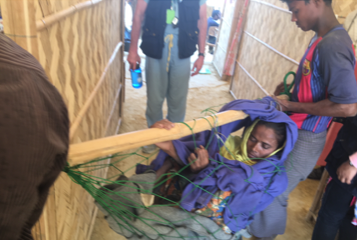The hour-long van drive from our housing in Cox’s Bazar, Bangladesh to the 1 million Rohingya refugee camp was always filled with a bit of angst on what we would be able to do that day in our makeshift “medical clinic” made of lashed bamboo, dirt floors, generous use of canvas tent material and hard plastic chairs. We had no electricity or running water in the clinic but neither did the refugees living there. I usually spent most of the hour drive praying my Rosary that I would have the strength of mind to deal with the charge put upon me by our savior.
My Mission Doctors’ training instilled in me that I had the honor and herculean task of being the hands and feet of Jesus to provide care to the less fortunate. However, my anxiety was amplified this week since the UN was still vaccinating everyone for the mini cholera outbreak, and we were in the midst of a Mumps and Diphtheria eruption. After three military checkpoints, I donned my rubber boots and began the ¾ mile trek through early monsoon mud to our clinic.
Providing medical care in third-world countries has its innate challenges. The situation is magnified when servicing Muslim refugees who had their homes and villages burned down by the Myanmar military, husbands and fathers shot, women raped, and babies thrown into fires or the river. Growing up as a minority the Rohingya did not trust any outside authority, had received no western medical care or immunizations, could not read, had nothing except what was given to them by the UN, and now had a white (i.e. non-Muslim) doctor to rely on.
I relied on their strength of our common God of Abraham and my desire to provide them with the gifts Jesus had passed down to me from my teachers. My first patient that 102’ day was a 28-year-old mother of five dressed in three layers of head-to-toe clothing covered with a black thick abaya robe and hijab. She was short of breath with fever and cough and very low oxygen saturation levels. Since we had no x-ray, laboratory, oxygen, portable ultrasound, or other therapeutic modalities except oral antibiotics, I treated her with an antibiotic injection, lung puffer and started making plans.
We faced many obstacles to treat her moderately severe pneumonia. A dirt floor smoke-filled home made of six long pieces of bamboo and a plastic tarp, an indoor cooking fire, a mat for a bed, with no running water or electricity, was not exactly conducive to healing. She would need to be carried in a rope sling, back over the ¾ mile mud path to a drivable road. Here a Tuk Tuk would be used to go to a makeshift Medecin Sans Frontiers hospital, which had minimally, more than our clinic. Her husband initially refused to let her go to the hospital since no one would be home to care for the five children. Eventually, the local Muslim Iman (priest) talked the husband of the dire need.

Practicing medicine in a refugee camp has many hurdles on an hour-by-hour basis. With poor sanitation, education, malnutrition, excessive crowding, environmental challenges, and poverty, death, and disease come easily. The refugees rely on their fervent faith in God to guide them and determine their fate. It is only by relying on that same God of Abraham that I was able to face the daily challenges put before me.
Christ has no body but yours,
No hands, no feet on earth but yours,
Yours are the eyes with which
He looks Compassion on this world,
Yours are the feet with which He walks to do good,
Yours are the hands, with which He blesses all the world.
Yours are the hands, yours are the feet,
Yours are the eyes, you are His body.
Christ has no body now but yours,
No hands, no feet on earth but yours,
Yours are the eyes with which he looks compassion on this world.
Christ has no body now on earth but yours.
— St. Teresa of Ávila
